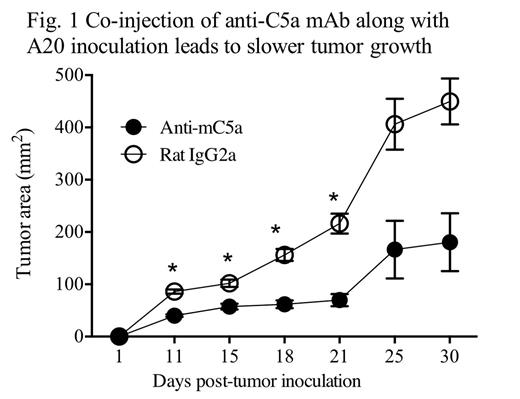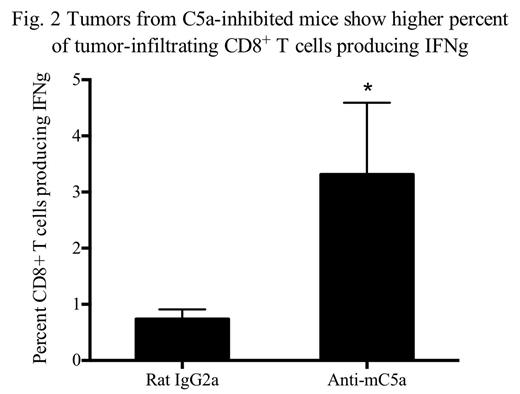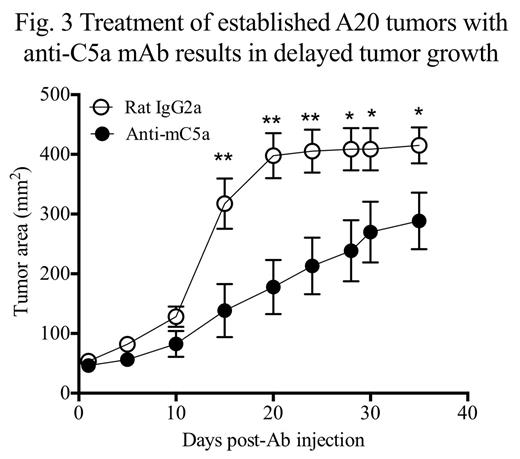Abstract
Background: The complement system can have both pro-inflammatory and immunosuppressive effects. Our preliminary studies demonstrated that C5a can limit antigen-specific responses, in part, by enhancing the induction of immunosuppressive T regulatory (Treg) cells by primary human antigen-presenting cells and malignant B cells. The current study explored the effect of intratumoral C5a on B lymphoma progression and intratumoral T cells using the A20 murine lymphoma mouse model.
Methods:
(A) Co-injection approach: Female Balb/C mice were subcutaneously injected with A20 B lymphoma cells mixed with either 20 μg of rat anti-mouse C5a neutralizing monoclonal antibody (mAb) or matching isotype control mAb. Tumor growth was followed and the phenotype of tumor-infiltrating lymphocytes analyzed by flow cytometry.
(B) Therapeutic approach: Established subcutaneous A20 tumors (7-9 mm diameter) were treated intratumorally with 20 µg of anti-mouse C5a neutralizing mAb (considered as day 1). A second dose (20 µg) of mAb was given intratumorally on day 5. Control mice were treated similarly with matching isotype control mAb. Tumor growth was followed.
Data was analyzed using standard t-test (for tumor growth and immune responses) and Log-rank (Mantel-Cox) test (for comparing survival).
Results:
(A) Co-injection approach: Co-injection of anti-C5a mAb at the time of tumor cell inoculation significantly delayed A20 tumor growth (Fig. 1; p<0.05) and led to prolonged survival of anti-C5a-treated tumor-bearing mice when compared to the control mice (p=0.001).Tumors from mice that were co-injected with anti-C5a mAb showed significantly higher infiltration of activated CD8+ T cells producing IFNg than the control mice (Fig. 2; p=0.034). Anti-C5a-treated mice also had a lower percentage of circulating Tregs (p=0.023) and splenic Tregs (p=0.0001) compared to control mice.
(B) Therapeutic approach: Treatment of pre-established subcutaneous A20 tumors with anti-mouse C5a mAb slowed tumor growth significantly when compared to the control mice (Fig. 3; **p<0.01; *p<0.05). Tumor-bearing mice treated intratumorally with anti-C5a also showed significant improvement in the survival when compared to tumor-bearing mice treated with isotype control Ab (p=0.008).
Conclusions:
Intratumoral anti-C5a mAb therapy inhibits progression of B lymphoma and improves survival, likely by reducing immunosuppression. We are currently exploring the mechanisms behind C5a-promoted tumor immunosuppression.
No relevant conflicts of interest to declare.
Author notes
Asterisk with author names denotes non-ASH members.




This feature is available to Subscribers Only
Sign In or Create an Account Close Modal